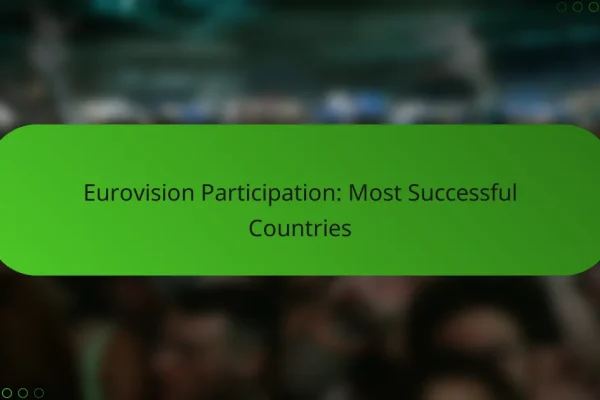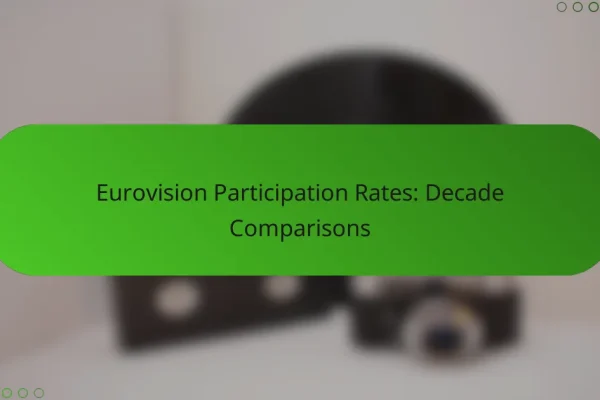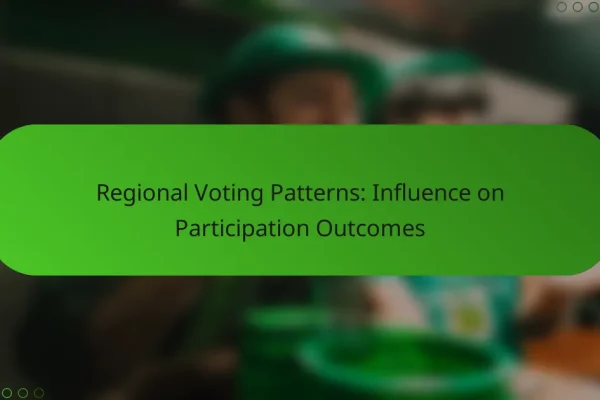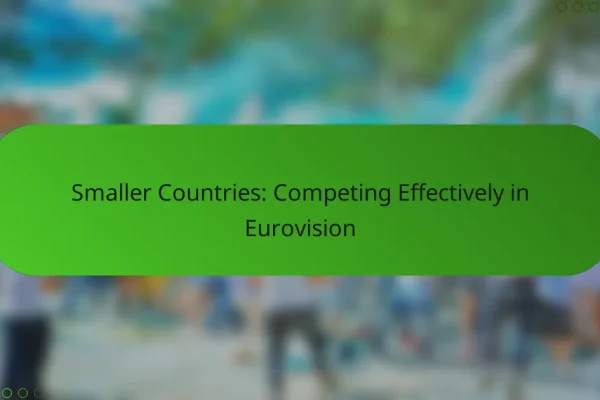How to participate in the Eurovision Song Contest?
To participate in the Eurovision Song Contest, countries must be members of the European Broadcasting Union (EBU) and follow specific guidelines set by the contest. Each participating country selects a representative act to perform in the competition, which takes place annually.
Application process overview
The application process for the Eurovision Song Contest involves several key steps. First, a country must confirm its participation by submitting an official application to the EBU, typically several months before the event. This includes details about the selected artist and song.
Once the application is accepted, the country prepares for the national selection process, which may involve public voting, jury selection, or a combination of both. It is crucial to adhere to deadlines set by the EBU to ensure eligibility.
Eligibility criteria for countries
For a country to participate in the Eurovision Song Contest, it must be a member of the EBU or have a special invitation to join. This includes countries from Europe and some non-European nations that have broadcasting agreements with the EBU.
Additionally, each country must comply with the contest’s rules, which include regulations on song length, originality, and language. Countries that fail to meet these criteria may be disqualified from the competition.
Selection methods for national representatives
Countries use various methods to select their representatives for the Eurovision Song Contest. Common approaches include national finals, where multiple artists compete, and internal selections, where broadcasters choose an artist directly.
National finals often involve public voting, jury input, or a mix of both, allowing viewers to engage in the selection process. Internal selections can streamline the process but may limit public involvement. Each method has its advantages, such as broader audience engagement or quicker decision-making.
What are the benefits of participating in Eurovision?
Participating in the Eurovision Song Contest offers significant advantages for artists and host countries alike. Artists gain international exposure, while host nations experience increased tourism and cultural engagement.
Increased visibility for artists
Eurovision provides a unique platform for artists to showcase their talent to millions of viewers across Europe and beyond. This exposure can lead to increased streaming numbers, social media followers, and opportunities for international tours.
Many artists who perform at Eurovision see a surge in their careers, with some even achieving chart success in multiple countries. For instance, past contestants have landed record deals and gained invitations to major music festivals following their participation.
Boost in tourism for host countries
Hosting the Eurovision Song Contest can significantly boost tourism in the host country. The event attracts thousands of visitors, including fans, media, and industry professionals, who contribute to the local economy through spending on accommodations, dining, and entertainment.
Countries that host Eurovision often see an increase in hotel bookings and flight reservations during the event period. For example, cities that have hosted in the past reported tourism spikes of 20-30% during the contest week, highlighting the economic impact of this international spectacle.
What are the costs associated with Eurovision participation?
Participating in the Eurovision Song Contest involves various costs that can significantly impact a country’s budget. These expenses typically include national selection costs, production and staging expenses, and promotional activities.
National selection costs
National selection costs refer to the expenses incurred during the process of choosing a representative for Eurovision. This may involve organizing a national competition, which can include venue rentals, marketing, and production costs for the event.
Countries often spend anywhere from a few thousand to several hundred thousand euros on national selection, depending on the scale and format of the event. It’s essential to consider both direct costs and potential sponsorships that can offset expenses.
Production and staging expenses
Production and staging expenses encompass the costs associated with creating the performance for Eurovision. This includes set design, lighting, sound equipment, and any special effects that may enhance the act.
These costs can vary widely, typically ranging from tens of thousands to several million euros, depending on the complexity of the performance and the resources available. Countries should prioritize effective staging that aligns with their budget while still making a memorable impact.
How does the voting system work in Eurovision?
The Eurovision voting system combines public votes and jury votes to determine the winner. Each participating country awards points based on the preferences of both the audience and a professional jury, creating a balanced outcome that reflects diverse opinions.
Public voting process
The public voting process allows viewers to influence the outcome by casting votes for their favorite performances. Each country can vote via phone, SMS, or a dedicated app, typically allowing for a limited number of votes per person.
Votes are collected and converted into points, with the top ten entries receiving points ranging from 1 to 12, excluding 11. This system encourages fans to support their preferred acts while promoting a competitive atmosphere.
Jury voting explained
Jury voting involves a panel of music professionals from each participating country who assess the performances. Each jury typically consists of five members who rank their top ten favorites, awarding points similarly to the public voting system.
The jury’s scores are combined with the public votes to create a final ranking. This dual approach aims to balance popular opinion with expert critique, ensuring that both fan favorites and high-quality performances are recognized in the final results.
What are the historical trends in Eurovision participation?
Eurovision participation has evolved significantly since its inception in the mid-1950s, with fluctuations in the number of countries entering the competition. Initially featuring just seven countries, the contest now includes over 40 participants, reflecting broader geopolitical changes and cultural interests across Europe.
Changes in participating countries over the years
The number of countries participating in the Eurovision Song Contest has generally increased, particularly after the end of the Cold War. Newer nations, especially those from Eastern Europe, joined the competition in the 1990s and 2000s, contributing to a diverse range of musical styles and performances.
In recent years, some countries have withdrawn or returned to the contest, influenced by factors such as financial constraints or political considerations. For instance, countries like Italy and Austria have experienced periods of absence but have since rejoined, showcasing the contest’s dynamic nature.
Impact of political factors on participation
Political factors can significantly influence a country’s decision to participate in Eurovision. Tensions between nations may lead to withdrawals or boycotts, as seen with countries like Russia and Ukraine, where political relations have affected their participation and voting patterns.
Moreover, the contest has occasionally been used as a platform for political statements, which can lead to controversies and affect public perception. Countries may choose to participate or abstain based on their current political climate, impacting the overall diversity of the competition.
What are the prerequisites for Eurovision participation?
To participate in the Eurovision Song Contest, countries must meet specific prerequisites that include membership in the European Broadcasting Union and adherence to the contest’s rules. These requirements ensure that all participating nations are recognized and that their entries comply with the established guidelines.
Membership in the European Broadcasting Union
Membership in the European Broadcasting Union (EBU) is essential for any country wishing to enter the Eurovision Song Contest. The EBU is a network of public service broadcasters, and only its members can participate in the competition.
Countries can apply for EBU membership, but they must meet certain criteria, such as having a public broadcasting service that operates independently. Membership fees vary based on the size and revenue of the broadcaster, and countries outside Europe may also be eligible under specific conditions.
Compliance with contest rules
Compliance with Eurovision’s contest rules is crucial for participation. Each entry must adhere to guidelines regarding song length, originality, and language. For example, songs typically should not exceed three minutes and must be original works not released prior to a specified date.
Additionally, countries must select their representatives through a national selection process or internal appointment, ensuring that the chosen artist and song align with the contest’s standards. Familiarizing oneself with the official rules published by the EBU is essential to avoid disqualification.
How to improve chances of winning Eurovision?
To enhance your chances of winning Eurovision, focus on creating a unique and high-quality song, paired with a captivating performance. Engaging staging and strong vocal delivery can significantly influence both juries and public voters.
Song quality and originality
The song must stand out in terms of quality and originality to capture the audience’s attention. Aim for a catchy melody, relatable lyrics, and a distinctive style that reflects your country’s culture while appealing to a broad audience.
Consider the song’s structure; a strong chorus and memorable hooks can make a lasting impression. It’s beneficial to analyze past winners to identify common elements, such as emotional resonance and innovative arrangements.
Effective staging and performance
Staging and performance play a crucial role in how a song is received. Invest in visually striking elements that complement the song’s theme, including lighting, choreography, and costumes. A well-rehearsed performance can elevate the overall impact.
Engage with the audience through eye contact and dynamic movements. Consider using props or background dancers to enhance the visual storytelling. Remember, the performance should feel authentic and connect emotionally with viewers, making them more likely to vote for you.
What are the most memorable Eurovision performances?
Memorable Eurovision performances often stand out due to their unique staging, powerful vocals, and engaging choreography. Iconic acts like ABBA and Celine Dion have left lasting impressions, showcasing the contest’s ability to launch international careers.
Notable winners and their impact
Eurovision has produced numerous notable winners whose influence extends beyond the contest. For instance, ABBA’s victory in 1974 with “Waterloo” not only catapulted them to global fame but also set a standard for pop music that resonates today.
Another significant winner is Celine Dion, who won in 1988 representing Switzerland with “Ne Partez Pas Sans Moi.” Her success at Eurovision helped establish her as a leading artist in the music industry, demonstrating the contest’s role as a springboard for talent.
More recently, the Italian band Måneskin won in 2021 with “Zitti e buoni,” sparking a resurgence of interest in rock music within the contest. Their energetic performance and subsequent global success highlight how Eurovision can influence music trends and introduce new genres to a wider audience.












